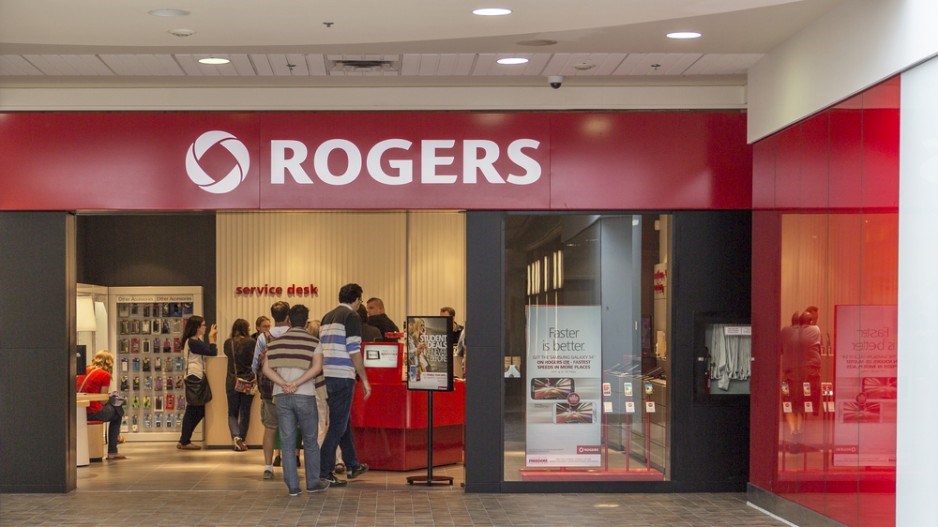The high-profile legal wrangling for control of Rogers Communications Inc. (RCI) - Canada’s largest telecom company – will hit a B.C. courtroom Monday morning, kicking off a likely bitter battle between family members on top of the firm.
The case between Edward Rogers, son of the late company founder Ted Rogers, and members of the board of directors at the top of RCI (including Edward Rogers’ own mother and two sisters), will kick off in front of B.C. Supreme Court justice Shelley Fitzpatrick in Vancouver.
The outcome of the case will not only determine who runs the company, but also its future direction at a pivotal moment (where RCI is in the process of acquiring rival Shaw Communications in a $26-billion deal announced in March).
In statements late last week, Loretta Rogers – Edward’s mother – retorted her son’s petition that Ted Rogers intended a central, decisive figure in the family trust that owns controlling interest over RCI.
According to Loretta Rogers, her son’s bid to unilaterally add and remove members to RCI’s board through his position as chair of the Rogers Control Trust – even as he was voted out as the chair of the RCI board itself just days earlier – is an attempt “to exploit” an entrusted position as chair of the Trust “to circumvent” the wishes of the late RCI founder in structuring the company as two-tier public entity.
RCI is publicly traded, but the Trust holds 97% of its voting shares, ensuring the Rogers family control over the company’s direction.
Last week, Edward Rogers filed his petition with B.C. Supreme Court, noting that given RCI was incorporated in B.C., the regulations under the B.C. Business Corporations Act should be in effect. That, Edward Rogers contends, allows him to make changes to RCI’s board as chair of the Trust – since he represents the majority of voting shareholders.
Edward Rogers is seeking the court to enforce his removal of five directors who voted him off the RCI board earlier this month, his naming of five new directors to the board, and a later vote that re-established him as RCI’s company board chair.
Reports indicated that RCI’s board will argue the rights of all shareholders in its rebuttal – that Edward Rogers cannot unilaterally make changes without holding shareholder meetings.
The rift between Edward Rogers and the rest of his family began a few months back, according to court filings. That was when Rogers said he decided to act on his concerns over the leadership of RCI CEO Joe Natale – wishing to replace Natale with then-CFO Tony Staffieri as RCI share prices continued to lag behind rivals like Telus and Bell Canada.
Edward Rogers said he originally had the backing of his mother and sister Martha Rogers for a Sept. 22 meeting to go ahead with the plan, but was confronted at a Sept. 26 meeting that both had switched sides and joined with another sister, Melinda Rogers-Hixon, in pushing a plan to keep Natale and fire Staffieri instead.
RCI announced Staffieri’s firing on Sept. 29, followed by meetings where Edward Rogers was voted (in his absence) out as RCI board chair. However, the board did not have enough votes to oust Edward Rogers from his position as chair of the Control Trust – which would require a super-majority of 67%.
It was at this time when Edward Rogers announced his intended board changes, using his role as the Control Trust chair.
In court filings by RCI Friday, John MacDonald – who was named by the RCI board to replace Edward Rogers as chair (and was then named as one of the directors slated to be removed from the board by Edward Rogers) – said several board members already had concerns about the late company founder’s son having plans to remove Natale when they first learned of those plans on Sept. 15.
According to MacDonald’s filings, board members felt Natale “had met the requisite performance criteria and exceeded his goals.” That’s why board members spoke out against the plans for Natale’s removal at the Sept. 22 meeting.
MacDonald also added in his affidavit that stepping down – as Edward Rogers’ announcement required – would disrupt the company’s work as it endeavoured to defend “good governance protocols.”
In another affidavit, Rogers Wirelss president Dave Fuller expressed full support for keeping Natale, saying he would not work under a higher proposed role by Edward Rogers in the event that Natale was removed as RCI president and CEO.
“He is the only reason I joined RCI, and I do not wish to work for any other CEO,”Fuller said in RCI filings.
Fuller also denied knowing that Edward Rogers had a plan in place to replace Natale.




